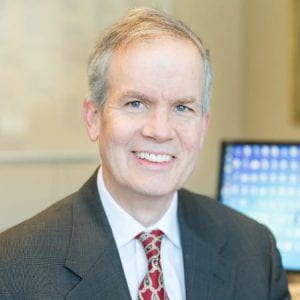What motivates adult learners to pursue a graduate degree? There are, of course, a multitude of reasons. In an era of digital disruption, many communicators seek new knowledge or skills. Others are interested in experiential opportunities to strengthen their resumes. Still others view a graduate degree as a pathway to career advancement — credentials do matter! We all expect a return on investment in our time and money. But we’re talking about something more consequential — a return on education. That common motivational thread for students in our Corporate and Organizational Communication program is a passion for communication, a passion for learning.
This is what Professor of Practice Ed Powers learned in an interview with Josh Gelinas, a PR professional from North Carolina who will soon be completing his master’s program.
Ed Powers (EP): Josh, can you tell us about your current position at AT&T?
Josh Gelinas (JG): I work in the company’s Corporate Social Responsibility organization and manage education and social innovation communications. My responsibilities span the communications and marketing spectrum, from message strategy and development, to communications campaign planning and execution, to reputation measurement and risk management.
EP: You hold your Accreditation in Public Relations (APR) and have almost completed your master’s program. What motivated you to continue your professional education?
JG: It’s been a journey of discovery for me. At every stage of my career I’ve been confronted with challenges I wanted to overcome. The APR program really hit home how critical it is to manage communications from start to finish – research, planning, implementation and evaluation, or RPIE as it’s often referred to. I’ll never forget that acronym.
The world of communication has changed radically since I graduated college in 1999. I’ve worked in communications in one way or another since undergrad, and the curriculum at Northeastern has forced me to ask tough questions about my skills and abilities and drove me to keep growing into the leader I aspire to become.
EP: As you know, Northeastern is the only university to recognize the competencies demonstrated by holders of the APR accreditation by granting transfer credit. What aspect of the transfer credit opportunity was most appealing to you?
JG: The ability to accelerate through the program was appealing. More important than that, though, was the confidence it gave me knowing Northeastern valued what I’d learned through the APR process. I’d been on the fence about graduate school for a long time. Getting credit for APR gave me the boost I needed to take the plunge.
EP: What would you say to the PR professional who may be hesitant to return to school for a master’s degree or, for that matter, any form of lifelong learning?
JG: Do it. Do it because if you’re reading this you’re serious about your career and take pride in the work you do.
There’s a long history of communications and public relations roles being thought of as just “staff” support functions. They’re not. Communication is critical to the creation of successful strategy, from planning to execution. The masters-level communication curriculum makes this connection clear, and provides the tools needed to make it happen.
Posted by Ed Powers, Faculty.
Did you know: Several College of Professional Studies programs accept transfer credit based on certifications from IABC, PRSA, SHRM, STC, HRCI, and HubSpot Academy. We believe that demonstrated competency should be recognized.